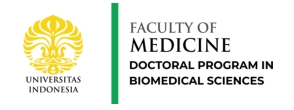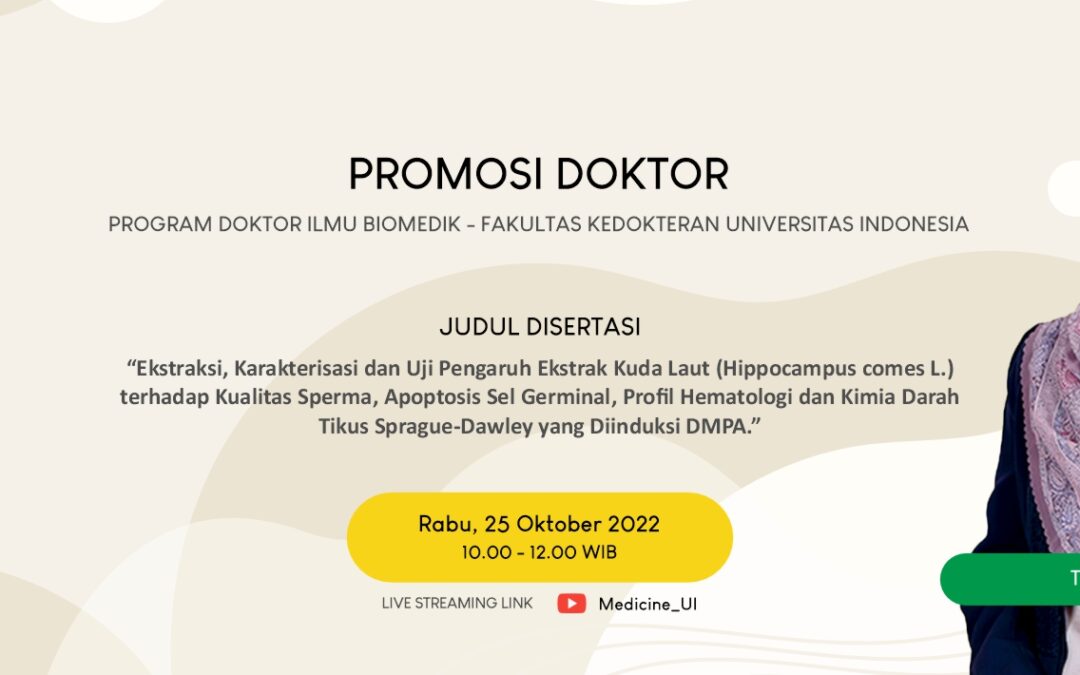Ekstraksi, Karakterisasi dan Uji Pengaruh Ekstrak Kuda Laut (Hippocampus comes L.) terhadap Kualitas Sperma, Apoptosis Sel Germinal, Profil Hematologi dan Kimia Darah Tikus Sprague-Dawley yang Diinduksi DMPA
Oleh : Trisnawati, S.Si., M.Kes
Infertilitas saat ini menjadi salah satu masalah kesehatan reproduksi dan diperkirakan oleh World Health Organization (WHO) menjadi penyakit terbesar ketiga setelah tumor dan kardiovaskular. Infertilitas dapat terjadi pada satu dari enam pasangan suami istri (pasutri) usia produktif yang disebabkan oleh banyak faktor, salah satunya adalah faktor laki-laki. Infertilitas pada laki-laki juga dipengaruhi oleh berbagai faktor, yaitu gangguan hormon, faktor fisik, penyakit menular seksual, faktor lingkungan dan gaya hidup serta faktor genetik. Salah satu jenis infertilitas pada laki-laki adalah hipogonadisme. Hipogonadisme dapat dipengaruhi faktor hormonal. Gangguan hormonal akibat adanya gangguan poros hipotalamus-hipofisis-testis dalam mengatur konsentrasi hormon yang dapat memengaruhi produksi sperma.
Saat ini pengobatan terhadap masalah infertilitas yang menggunakan produk alami dari alam semakin berkembang dengan mengeksplorasi manfaat bahan alam, baik flora ataupun fauna. Salah satu fauna yang berpotensi adalah kuda laut (Hippocampus spp.). Dari berbagai penelitian yang telah dilakukan, sampai saat ini belum ada laporan tentang pengaruh ekstrak kuda laut jenis Hippocampus comes L. terhadap infertilitas. Padahal jenis ini termasuk yang paling banyak populasinya di Indonesia dan telah banyak digunakan sebagai obat tradisional (alami) secara turun-temurun oleh masyarakat.
Penggunaan obat baik berbahan dasar dari alam ataupun obat kimiawi haruslah dapat dipastikan tingkat keamanannya. Keamanan suatu obat yang dikonsumsi perlu diperhatikan, salah satunya dengan pemeriksaan profil hematologi dan kimia darah. Profil hematologi penting untuk menilai komponen seluler, sedangkan kimia darah digunakan untuk mengevaluasi komponen yang terdapat dalam cairan darah. Oleh karena itu, penelitian ini bertujuan untuk mengkarakterisasi ekstrak kuda laut Hippocampus comes L. dan mengetahui bagaimana pengaruhnya terhadap kualitas sperma, kadar hormon testosteron, apoptosis sel kelamin, profil hematologi, kimia darah dan berat badan tikus yang diinduksi hipogonad.
Kuda laut yang digunakan dalam penelitian ini, yaitu jenis Hippocampus comes L. berasal dari hasil budidaya dan alam dan diekstraksi menggunakan pelarut etanol dan air. Penelitian diawali dengan pembuatan serbuk kuda laut menggunakan grinder dan kemudian dilakukan analisis proksimat. Selanjutnya dilakukan proses ekstraksi menggunakan metode maserasi dan karakterisasi ekstrak meliputi nilai rendemen, golongan senyawa, kandungan asam amino dan golongan steroid.
Hasil penelitian menunjukkan bahwa kadar proksimat cenderung lebih tinggi pada kuda laut yang berasal dari alam. Karakterisasi ekstrak diperoleh hasil bahwa kuda laut mengandung alkaloid, triterpenoid, asam amino esensial dan nonesensial, glikosida steroid dan nilai rendemen ekstrak yang juga cenderung lebih tinggi pada kuda laut dari alam dengan pelarut air. Hasil ini digunakan sebagai acuan untuk penggunaan ekstrak kuda laut yang diujikan pada hewan coba.
Penelitian kemudian dilanjutkan dengan uji menggunakan hewan coba yang terdiri atas tiga puluh ekor tikus jantan galur Sprague-Dawley yang diinduksi hipogonad dengan Depo Medroksiprogesteron Asetat (DMPA) pada minggu ke-0 dan ke-12. Tikus secara acak dibagi dalam kelompok perlakuan yang dicekok dengan akuades, CMC 1%, dan ekstrak kuda laut pada dosis yang berbeda yang dimulai pada minggu ke-7. Perlakuan hewan coba dilakukan selama 18 minggu, dan diakhir penelitian semua tikus diterminasi dengan ketamin dan xylazine untuk segera diambil darah, jaringan testis dan air mani dari vas deferen untuk dilakukan pengamatan terhadap parameter kualitas sperma, kadar hormon testosteron, apoptosis sel kelamin, profil hematologi, kimia darah dan berat badan tikus.
Analisis data menunjukkan bahwa parameter kualitas sperma dan kadar hormon testosteron pada kelompok tikus yang diberikan ekstrak kuda laut cenderung meningkat dibandingkan dengan kelompok yang tidak diberi ekstrak kuda laut. Evaluasi terhadap proses apoptosis sel kelamin menunjukkan kecenderungan penurunan apoptosis pada kelompok yang mendapat ekstrak kuda laut, namun tidak memengaruhi profil hematologi, kimia darah dan berat badan tikus yang diinduksi hipogonad.
Simpulan yang diperoleh dari hasil penelitian ini menunjukkan bahwa kuda laut Hippocampus comes L. berpotensi sebagai bahan alam yang memiliki manfaat terhadap kualitas sperma, peningkatan hormon testosteron, penurunan apoptosis sel kelamin, dan tidak memengaruhi profil hematologi dan kimia darah serta berat badan pada tikus yang diinduksi hipogonad. Namun, perlu dilakukan penelitian lanjutan dengan mengeksplorasi manfaat kuda laut terhadap biomarkah sel dan molekul secara komprehensif sehingga dapat digunakan dalam pengembangan potensi kuda laut sebagai salah satu Marine Natural Products (MNPs) yang dapat meningkatkan nilai tambah kuda laut Hippocampus comes L. sebagai salah satu keanekaragaman hayati Indonesia dalam bidang industri obat.

